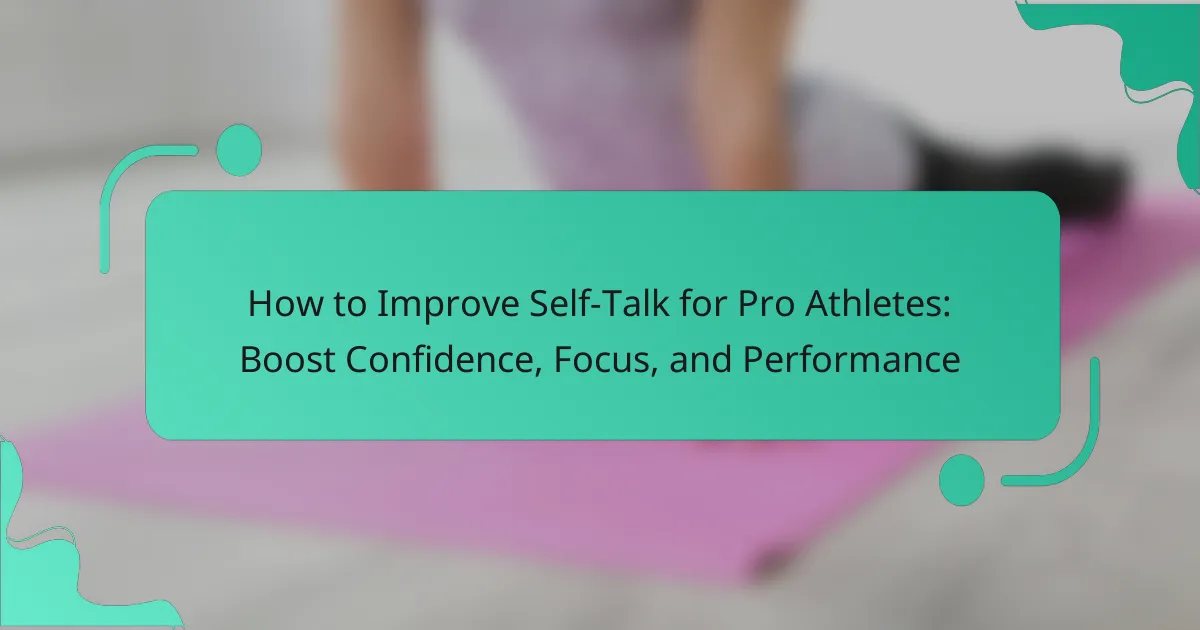Improving self-talk can significantly enhance pro athletes’ confidence, focus, and performance. This article explores techniques like positive affirmations, goal setting, and mindfulness practices. These strategies help athletes combat negative thoughts, maintain motivation, and reduce anxiety during competitions. By adopting these methods, athletes can create a mental environment that supports peak performance.

How can self-talk enhance performance for pro athletes?
Self-talk can significantly enhance performance for pro athletes by boosting confidence, focus, and motivation. Positive self-talk encourages a growth mindset, helping athletes overcome challenges and maintain concentration during competitions. Research shows that athletes who engage in constructive self-talk experience reduced anxiety and improved overall performance. Techniques such as affirmations, visualization, and reframing negative thoughts are effective strategies for enhancing self-talk. By integrating these practices, athletes can cultivate a mental environment conducive to peak performance.
What are the key components of effective self-talk?
Effective self-talk for pro athletes includes positive affirmations, visualization techniques, and goal-setting strategies. These components enhance confidence, focus, and overall performance. Positive affirmations reinforce self-belief, while visualization helps athletes mentally prepare for success. Goal-setting provides clear direction, enabling athletes to track progress and maintain motivation. Incorporating these elements into daily routines can significantly improve mental resilience and performance outcomes.
How does positive self-talk differ from negative self-talk?
Positive self-talk focuses on encouragement and constructive thoughts, while negative self-talk emphasizes criticism and doubt. Pro athletes can enhance performance by recognizing this difference. Positive self-talk boosts confidence, leading to improved focus and better results. In contrast, negative self-talk can hinder performance by fostering anxiety and self-doubt. Recognizing these patterns allows athletes to shift towards a more positive mindset, ultimately enhancing their overall performance.
What role does self-talk play in mental resilience?
Self-talk significantly enhances mental resilience by fostering a positive mindset. It helps athletes maintain focus, manage stress, and boost confidence during challenging situations. Effective self-talk can transform negative thoughts into constructive ones, promoting a stronger mental state. Research indicates that positive self-talk correlates with improved performance metrics in athletes, highlighting its role as a unique attribute of mental resilience. By practicing self-talk techniques, athletes can cultivate a resilient mindset, essential for peak performance.
What are the universal benefits of improving self-talk?
Improving self-talk offers universal benefits like enhanced confidence, better focus, and improved performance for pro athletes. By fostering positive self-dialogue, athletes can overcome mental barriers and maintain motivation. This mental shift can lead to increased resilience during competition, allowing for peak performance under pressure. Research indicates that athletes who engage in constructive self-talk experience a significant reduction in anxiety and an increase in overall satisfaction with their performance.
How does self-talk boost confidence in high-pressure situations?
Self-talk significantly boosts confidence in high-pressure situations by enhancing focus and reducing anxiety. Positive self-talk creates a mental environment that fosters resilience, empowering athletes to perform at their best. Research shows that athletes who engage in constructive self-talk experience improved performance metrics, as it helps shift focus from fear of failure to a mindset of success. By consistently practicing affirmations and visualizations, athletes can develop a unique attribute of mental toughness, crucial for navigating competitive challenges.
What impact does self-talk have on focus and concentration?
Self-talk significantly enhances focus and concentration by fostering a positive mindset. Athletes who engage in constructive self-talk report improved performance and mental clarity. Studies indicate that positive affirmations can lead to a 20% increase in focus during critical moments in competition. By consciously directing self-talk, athletes can reduce anxiety and enhance their ability to concentrate on tasks. This unique attribute of self-talk serves as a powerful tool for maximizing performance in high-pressure situations.
What unique strategies can athletes use to enhance self-talk?
Athletes can enhance self-talk by using visualization, affirmations, and mindfulness techniques. Visualization helps athletes mentally rehearse successful performances, reinforcing confidence. Affirmations, such as positive statements about abilities, can shift mindset and focus. Mindfulness techniques promote present-moment awareness, reducing anxiety and enhancing performance. These strategies create a unique mental framework that supports peak performance.
How can visualization techniques complement self-talk?
Visualization techniques enhance self-talk by creating vivid mental images that reinforce positive affirmations. This combination boosts confidence and focus, leading to improved performance in athletes. Visualization can help athletes mentally rehearse successful outcomes, making self-talk more impactful. By integrating both methods, athletes can develop a strong mental framework that supports their goals.
What role do affirmations play in self-talk for athletes?
Affirmations significantly enhance self-talk for athletes by fostering a positive mindset. They help athletes build confidence, focus, and resilience during training and competition. Research indicates that positive self-talk can improve performance metrics, such as reaction time and endurance. Regular use of affirmations allows athletes to reframe negative thoughts, creating a unique attribute of mental fortitude. As a result, athletes who practice affirmations often experience reduced anxiety and increased motivation, leading to better overall performance.
What rare attributes of self-talk can lead to breakthroughs?
Rare attributes of self-talk that can lead to breakthroughs include self-affirmation, visualization, and reframing negative thoughts. Self-affirmation boosts confidence by reinforcing positive beliefs. Visualization enhances focus by mentally rehearsing successful outcomes. Reframing negative thoughts transforms challenges into opportunities, fostering resilience. These attributes empower pro athletes to overcome mental barriers and enhance performance.
How can self-talk influence injury recovery and mental health?
Self-talk significantly influences injury recovery and mental health by shaping athletes’ mindset. Positive self-talk enhances resilience, reduces anxiety, and promotes a focused recovery process. Research indicates that athletes who engage in constructive self-talk experience faster rehabilitation and improved emotional well-being. Techniques such as affirmations and visualization can further bolster self-talk effectiveness.
What are the less common methods for developing self-talk skills?
To develop self-talk skills, pro athletes can explore less common methods like visualization, mindfulness practices, and narrative reframing. Visualization involves creating mental images of successful performance, enhancing confidence and focus. Mindfulness practices help athletes become aware of negative self-talk patterns, allowing them to replace them with positive affirmations. Narrative reframing encourages athletes to reshape their internal dialogue by transforming limiting beliefs into empowering stories, fostering resilience and motivation.

How can pro athletes implement self-talk techniques in training?
Pro athletes can implement self-talk techniques in training by integrating positive affirmations, focusing on specific goals, and practicing mindfulness. These methods enhance confidence, concentration, and overall performance.
Positive affirmations help athletes combat negative thoughts, fostering a mindset geared towards success. For example, repeating phrases like “I am strong” or “I can achieve my goals” reinforces their belief in abilities.
Focusing on specific goals allows athletes to channel their self-talk towards actionable outcomes. By setting clear, measurable objectives, they can maintain motivation and track progress effectively.
Mindfulness practices, such as deep breathing and visualization, enable athletes to stay present and reduce anxiety. This mental clarity enhances their ability to perform under pressure, ultimately improving their competitive edge.
What are the best practices for integrating self-talk into daily routines?
Integrating self-talk into daily routines enhances performance for pro athletes. Start by setting specific times for self-talk, such as before training or competitions. Incorporate positive affirmations to build confidence and focus. Use visualization techniques alongside self-talk to reinforce mental imagery of success. Track progress and adjust phrases to ensure they resonate personally, fostering a growth mindset.
What common mistakes should athletes avoid in self-talk?
Athletes should avoid negative self-talk, unrealistic expectations, and comparisons to others. These mistakes can undermine confidence and focus, leading to decreased performance. Instead, fostering positive affirmations and realistic goal-setting enhances mental resilience.
What expert insights can improve self-talk for optimal performance?
To improve self-talk for optimal performance, athletes should focus on positive affirmations and visualization techniques. These strategies enhance confidence and concentration, leading to better results. Research shows that athletes who practice positive self-talk experience increased motivation and reduced anxiety. Additionally, incorporating mindfulness can help in maintaining focus during high-pressure situations. Regular practice of these techniques can significantly elevate performance levels in competitive environments.
